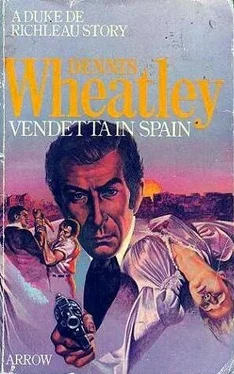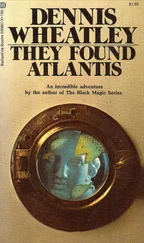T accept what you say, Sir, but permit me to remark that I fail to see what you can possibly hope to gain by keeping me in a watertight compartment. It stands to reason that my chances of success would be far greater if I were to have the help of the department of your police that specializes in following up the activities of anarchists.'
'Ha!' exclaimed the King. 'That is just where you are wrong. But since you are a foreigner it is not surprising that you should be puzzled by my attitude. The great majority of my people would be, too, for very few of them have sufficient knowledge of what goes °n behind the scenes to realize the difficulties of my situation.'
After a moment's pause, he continued, 'To accept this mission will be to court considerable danger, Count; so it is only right that I should disclose to you in confidence my reasons for distrusting my own police. That means going back a long way. I assume that, as an educated man, you know the main outlines of Spanish history; but even at the risk of boring you I must recall some of the events of the past in order to make clear to you the effect they have had on the present.'
Standing up, the King began to pace up and down while reeling off facts and dates that had been familiar to him from his earliest boyhood. 'In the past hundred years the only period in which the Spanish people have enjoyed peace and contentment under a King was the ten years' reign of my father, Don Alfonso XII of blessed memory. I said "under a King", mark you; that is important.
'Let us go back to the era of Napoleon. Charles IV was then King of Spain. He was a weak and foolish man. It is common knowledge that from the time of the French Revolution Queen Maria Louisa's lover, the upstart Godoy, was the real ruler of the country. So weak was the King that his elder son, Ferdinand, conspired to force his abdication, and more or less succeeded. That was in 1808 and Napoleon took advantage of their quarrel to intervene. Like the wily blackguard he was, he pretended to give both his support, tricked them both into coming to France to confer with him, then compelled both to abdicate and put his brother, Joseph Bonaparte, on the throne.
'Joseph proved a much better King than might have been expected. He did his best for the Spanish people and eventually quarrelled with his brother through placing their interests before those of France. But his reign was a terrible period for Spain, because the country became for years the battleground between the French and the Duke of Wellington aided by the Spanish patriots who had risen against their conquerors. You know the end. One after the other Napoleon's Marshals were defeated and by 1814 the French had been driven from the country.
'By then King Charles was dead; so it was Ferdinand who returned from exile to mount the throne. But meanwhile in 1812 the Cortes had met in Cadiz and given Spain a new Constitution. Abroad there seems to be a myth that Spanish sovereigns are absolute; but that is far from being the case. From mediaeval times there have always been Parliaments here that have to some extent restricted the powers of the monarchy. But the Constitution of 1812 went much further than any preceding one, because it was made by men who had been influenced by the democratic principles that emerged from the
French Revolution. That Constitution, with only slight modifications, is still in force and binding upon Spanish sovereigns today. Under it no decree that I may issue is valid unless it is countersigned by one of my Ministers.
'However, Ferdinand VII accepted and swore to observe it. He did nothing of the kind, and proved the worst type of autocrat. You must have seen his portrait by Goya many times. It would be hard to find a more cunning, shifty face, and that was the nature of the man. He had no sooner assumed power than he arrested all the leading Liberals, threw them into prison and confiscated their property. That was the root from which our worst trouble springs. It divided the Spanish people into two camps: those who supported the monarchy - they were in the majority, because, even under bad rulers, Spain has always been monarchist at heart - and a hard core of democrats made bitter by the persecution and determined sooner or later to get control of the Government.
4In 1823, driven to desperation by Ferdinand's arbitrary measures and oppressive taxation, the people revolted and made him a prisoner. But Louis XVIII of France sent an army that crushed the revolution and set him at liberty. One way and another, through trickery, treachery and the support of the Church and foreign troops, he succeeded in ruling as a despot for a quarter of a century. Then, on his very deathbed, this evil genius of my country left Spain another terrible legacy.'
Pausing in his stride for a moment, the King took a drink from his glass, then went on, 'You will, of course, know that in France the Salic law operated, by which no female could ascend the throne; and that with the ending of the Hapsburg dynasty in 1700 Louis XIV's grandson, the Due d'Anjou, became the first Bourbon King of Spain as Philip V. It was this French Prince who introduced the Salic law, which previously had not applied here. Ninety years later King Charles IV approved a resolution of the Cortes to revoke this law and revert to the old order of succession but, most unfortunately, the decree was never promulgated. Thus, the question whether a female could legally ascend the throne remained debatable.
'Ferdinand VII had no son; so two persons were Heirs Apparent: under the Salic law, his brother, Don Carlos, and under the old law, his daughter by his fourth wife, Queen Maria Cristina. In spite of the most vigorous protests from Don Carlos and many of the highest nobility, on his deathbed he designated as his successor his daughter, the Infanta Isabella, who was then only a child of two.
'Ferdinand had often said with cynical humour that Spain was a bottle of beer of which he was the cork, and that on his death it would blow up. By his malicious decision he ensured that it should. Don Carlos was in many ways a good man, and that he should become King was obviously preferable to saddling the country with the uncertainties of a long minority. Don Carlos decided to fight for what he considered to be his rights, and Spain was plunged into a hideous civil war. Behind him he had the Church, most of the aristocracy and all those best elements in Spain who treasured the old traditions of the country handed down from the time when Spain was a mighty Empire. Yet the forces of the Queen Regent emerged victorious. How, you may well ask? To keep her infant daughter on the throne she took the only course open to her and threw herself into the hands of the Liberals.
'At the date of Ferdinand's death she was still only twenty-six, and an exceptionally lovely woman. She had not long been a widow when she secretly married a Captain in her Guards named Munoz. Incredible as it may sound, still in secret she had nine children by him. The strain of keeping up appearances while leading this double life hardly bears thinking about, and naturally the affairs of the country suffered in consequence; she became a puppet in the hands of factions and military adventurers.
'In 1846 the young Queen, Isabella II, although only thirteen, was declared of age and married to her cousin, the Duke of Cadiz. He was a spineless creature, so the power emanating from the throne continued to be the plaything of unscrupulous intriguers. To worsen matters it soon became evident that she had inherited even more than the normal share of the Bourbon appetites.'
The King paused to smile, took another drink from his glass, which de Quesnoy had refilled, then added, 'Perhaps I should say "appetite" for in this case I have not so much in mind the gastronomic feats of Louis XIV or of Louis XVI, who frequently ate a whole chicken as a single course in a meal, but the amorous endurance which caused Henry of Navarre to be nicknamed Le Vert Galant, and led to Louis XV keeping a harem busy in his " Pare au Cerfs". Every handsome guardsman Queen Isabella set eyes on became grist to her mill, and her immoralities were so flagrant that after years of misrule by her favourites the people rebelled and threw her out.
Читать дальше












